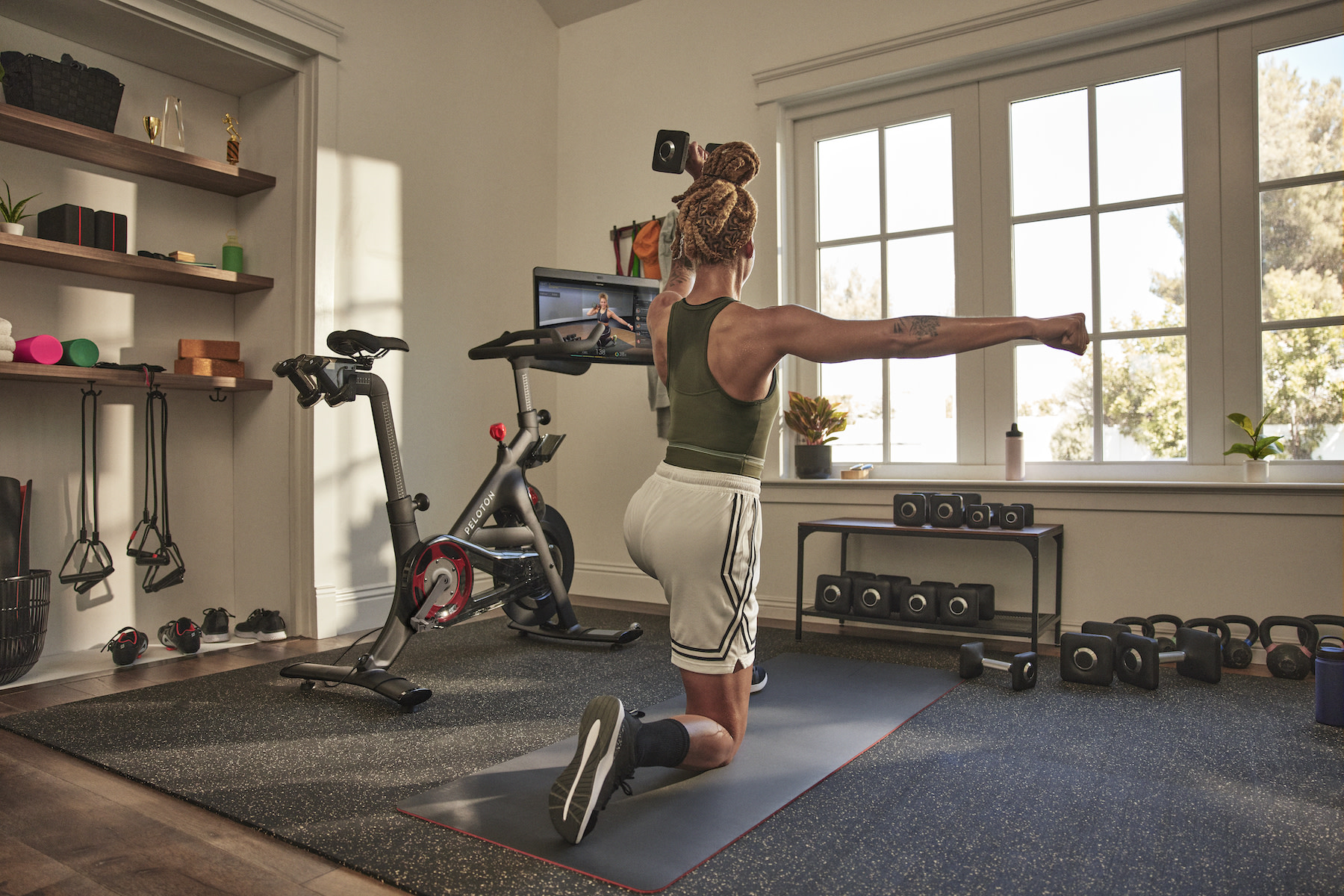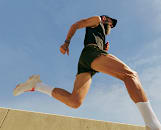
Should You Do Cardio or Weights First? An Expert Weighs In
An expert breaks down what you need to know.
By Kells McPhillips•
Can You Do Cardio and Strength Training On the Same Day?
Is It Better to Do Cardio or Weights First?
Benefits of Strength Training Before Cardio
Benefits of Doing Cardio Before Strength Training
The Best Types of Cardio to Combine With Weight Training
The Bottom Line: Cardio or Weight Training First
Whether you’re crunched for time or just trying to squeeze a little more juice out of your workouts, you’ve probably asked yourself: Should I double up on strength training and cardio on the same day? And if so—should you do cardio before or after weights? “Embarking on a fitness journey often brings the age-old dilemma for beginners—where should I kick things off: cardio or weights?” says Peloton instructor Assal Arian. “This decision isn't just a matter of personal preference; it can significantly impact your fitness goals.”
Discover more ways to reach your goals with Peloton
There’s a lot to consider when you’re deciding whether to pick up the weights or get your heart rate up with some cardio first. So below, Assal walks you through the dos and don’ts of scheduling cardio and strength training on the same day and tells you the benefits and potential pitfalls of prioritizing one over the other.
Can You Do Cardio and Strength Training On the Same Day?
Short answer: Yes. “For those just starting, experts often advocate incorporating both cardio and weights. This balanced approach not only enhances overall fitness but also aids in weight loss and establishes a solid foundation for more advanced training,” says Assal.
Intermediate and advanced fitness enthusiasts will also benefit from this two-for-one combo. Knocking out both strength and cardio in one fell swoop can save you time, challenge your muscles in unique ways, and help you work various systems in your body (like your aerobic and anaerobic systems) at once.
Of course, it’s ultimately up to you to check in with your body during these double sessions and decide if they feel good. Ask yourself: Can you maintain good form when you blend, say, strength training and cycling? Are you noticing that you can’t get a quality cardio session in if you pregame with weights? How easy or challenging is it to recover after these twofer sessions? All of these questions are part of being your own coach.
Is It Better to Do Cardio or Weights First?
Choosing if you should do cardio or weights first is a decision that you must make with your body and goals in mind. Everything from your fitness goals to how much time you have to work out may influence whether you hop on the treadmill or grab your weights first.
All of this said, there are two general rules to follow when it comes to order. The exercise you prioritize first should be the one most aligned with your fitness goals. And second, it’s a good idea to complete the most strenuous effort at the beginning, when you have a fresh supply of energy.
Below, Assal gives you the trainer insight you need to make the right decision for your body.
Benefits of Strength Training Before Cardio
If muscle gain is your main goal, you’ll want to grab your dumbbells before you start your HIIT workout. “Prioritizing weight training ensures your muscles are primed and ready, allowing for heavier lifts and fostering muscle growth,” says Assal.
Scheduling your strength training before you go for a run may also warm up your muscles so you can move with more ease. For example, if you work your legs at a moderate intensity, you may find that you can pick up the pace during your run. “Kick off with compound movements like squats, deadlifts, and bench presses. Mix in both heavy and moderate weights with fewer reps to induce muscle hypertrophy,” says Assal.
Disadvantages of Doing Weights Before Cardio
Of course, there are a few tradeoffs to remember if you decide to squat, deadlift, and bicep curl before you hop on the Peloton Bike. Research from the American Council of Exercise (ACE) indicates that doing cardio later in the workout increases heart rate overall compared to if cardio was performed first—even if the workout intensity level was the same. According to ACE, this can mean that your performance may take a hit if you’re doing a workout that feels harder than you aimed for. According to ACE guidance, saving strength training until after cardio can help ensure an effective workout that doesn't feel overly difficult.
Benefits of Doing Cardio Before Strength Training
“If you're gunning for enhanced endurance or cardiovascular health, kickstarting your session with cardio is the way to go. It readies your body for the challenges of weight training and lays the groundwork for a robust cardiovascular foundation,” Assal says.
Choosing a cardio-before-weights approach is ideal for those who are training for an endurance event like a marathon or triathlon. “Prioritize cardio exercises like running or cycling initially, followed by weight training with higher reps and lower weights to enhance muscular endurance,” says Assal.
One study found that a brief, 20-minute cardio warm-up before strength training may help you build muscle. (However, it’s important to note that the participants in the study did a cycling workout prior to doing a tricep strength exercise. So the results could vary if they did cycling followed by a lower body strength workout, for example.) “Initiating with cardio may stave off early fatigue during weight training, allowing for proper form and the lifting of heavier loads,” Assal explains. She adds that cardio even boosts your flexibility, making you less prone to injuries during your strength training regimen.

Peloton Bikes
Two bikes. One Peloton experience.
Disadvantages of Doing Cardio Before Weights
If your cardio session is intense, you may be fatigued by the time you switch gears and begin your resistance training. That’s why Assal recommends a specific approach for those focused on endurance training.
“Prioritize cardio exercises like running or cycling initially, followed by weight training with higher reps and lower weights to enhance muscular endurance,” says Assal. Muscular endurance refers to your body’s ability to repeat the same muscle movement again and again over time.
The Best Types of Cardio to Combine With Weight Training
Almost any type of cardio—from running to swimming to rowing—can be combined with weight training. The ACE says that running affects strength training more than cycling (when performed in the same session), so bear that in mind when you’re narrowing down which type of cardio you want to do today. ACE also recommends keeping your endurance training under 30 minutes to reduce the effect it could have on your strength workout—no matter which variety you choose.
However, Assal advocates for a periodization approach when you’re combining the two. “Alternate between phases of heavy lifting and high-intensity cardio to keep your body challenged and steer clear of plateaus,” she says.
For instance, maybe you alternate between five minutes on the Peloton Tread and 5K pace with heavy chest presses or Turkish get-ups. Or hop on the Bike for speed intervals interspersed with some core work.

Peloton Treadmills
Two treadmills. One Peloton experience.
The Bottom Line: Cardio or Weight Training First
Like many fitness decisions, the cardio before or after weights dilemma is a personal one. “The decision to prioritize cardio or weights hinges on your fitness goals and personal preferences. For beginners, it's all about consistency and gradually adapting your routine based on experience,” Assal says. “Whether you're on a muscle-building quest or aiming to boost endurance, mastering the art of structuring your workout is the key to achieving lasting success. Keep experimenting, stay motivated, and, above all, relish the journey to a healthier, fitter you.”
No matter what you decide, make sure you’re prioritizing your nutrition ahead of your double-header so that you have plenty of fuel in the tank when it comes time to clip in. And, after the workout is done and dusted, do everything you can to kickstart recovery. Stretch, hydrate, and sleep well.
Work Out Where You Want, When You Want

Peloton App
Access thousands of classes with no equipment needed.
This content is for informational and educational purposes only and does not constitute individualized advice. It is not intended to replace professional medical evaluation, diagnosis, or treatment. Seek the advice of your physician for questions you may have regarding your health or a medical condition. If you are having a medical emergency, call your physician or 911 immediately.
Level up your inbox.
Subscribe for a weekly dose of fitness, plus the latest promos, launches, and events.
By providing your email address, you agree to receive marketing communications from Peloton.
For more about how we use your information, see our Privacy Policy.











